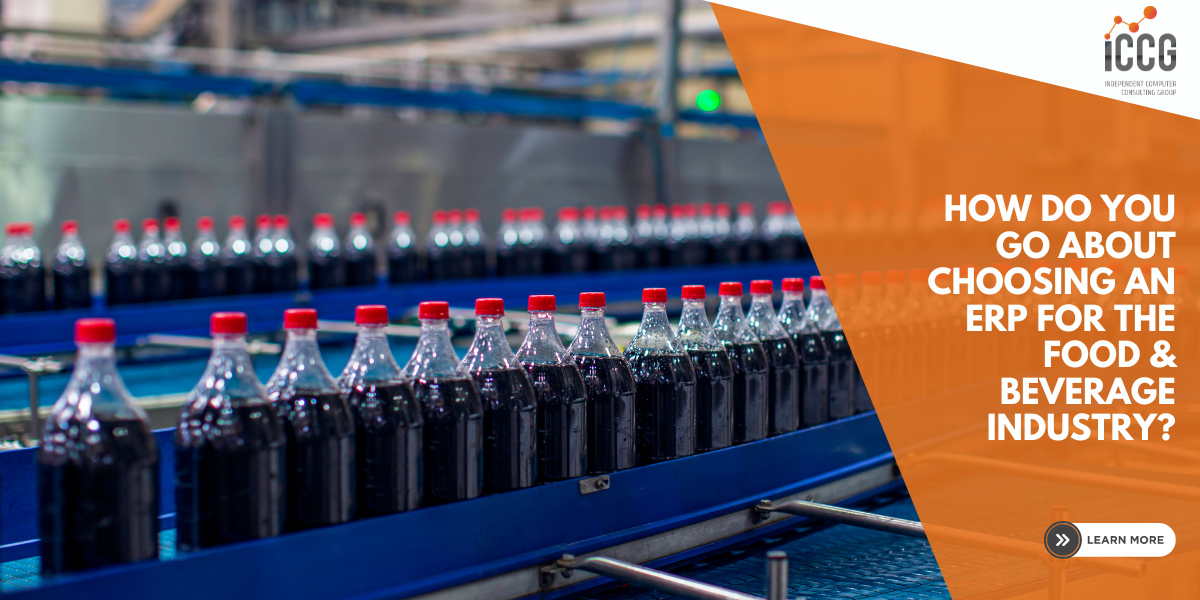
Are you struggling to choose the right ERP software solution for your business? At ICCG, we know that selecting the right ERP system can make all the difference in the success of your business operations. When evaluating ERP solutions for the food and beverage industry, it is essential to consider key selection criteria such as:
- Ease of use: A user-friendly ERP system can help you increase productivity, reduce training costs, and improve user adoption rates. Look for an ERP solution with an intuitive interface, customizable dashboards, and role-based access controls.
- System customization capabilities: Every business has unique requirements, and it is essential to select an ERP system that can be customized to meet your specific needs. Look for an ERP solution with a flexible architecture, open APIs, and a robust third-party ecosystem.
- Data security features: Protecting your sensitive business data is critical, especially in the food and beverage industry, where data breaches can result in severe reputational damage. Look for an ERP solution with robust data security features, including encryption, access controls, and regular data backups.
Read More
Topics: ERP, Food & Beverage, Infor M3, Enterprise Resource Planning, Infor M3 ERP, ERPSelection, MidMarket, ICCG
Our whole team wishes you great joy and happiness this holiday season. May the upcoming year be full of new achievements that will bring you great success. Happy New Year 2024!
Read More
Topics: Seasons Greetings, Happy Holidays
Since 1988, ICCG has provided innovative information technology solutions, always with an eye on the changing market and technological horizon. ICCG’s top-notch professionals offer complete application and IT infrastructure services and support to meet key business needs. Our long-time global customers continue to rely on us to satisfy their diverse and growing business needs. New customers are choosing ICCG for a variety of reasons. Chief among them are:
A Customer First Approach.
Precious. Unique. Valuable. In today’s ever-changing marketplace, there are two kinds of customers: Precious or Previous. At ICCG, we prefer the former. And that’s how we treat them. Our customers are precious as well as unique and valuable.
In 30+ years of business, we’ve worked with more than 100 customers worldwide – committed to their success. Dedicated to a long-term relationship. That’s our promise and commitment.
Read More
Topics: ERP, Distribution, Supply Chain, Supply Chain Visibility, Supply Chain Network, Cloud BI, Enterprise Asset Management, Enterprise Software, Supply Chain Operations, Supply Chain Management, Infor CloudSuite M3, Infor CloudSuite ERP
As organizations begin to face post-COVID economic recovery, they’re finding that the new normal requires a new breed of software. Outdated solutions with layers of modifications and patched applications have become tangled webs, trapping organizations in decades-old processes.
Yet organizations know they need to update their solutions to stay relevant. During the global pandemic, we learned some difficult lessons about supply chain vulnerability that no one wants to repeat. We also learned that remote workers can still be productive if they have the proper tools in place. Now, more than ever, organizations are reexamining how work gets done and how processes can be streamlined. Automation is often the answer, and cloud computing offers the ideal platform under which this transformation can take place and even thrive.
Read More
Topics: ERP, Distribution, Supply Chain, Supply Chain Visibility, Supply Chain Network, Cloud BI, Enterprise Asset Management, Enterprise Software, Supply Chain Operations, Supply Chain Management, Infor CloudSuite M3, Infor CloudSuite ERP
While sound supply chain management principles can apply to practically every organization, each supply chain is as unique as the businesses it supports. Every supply chain must include its unique blend of elements, such as product mix, go-to-market objectives, and supplier management strategy that best fits its markets.
Read More
Topics: ERP, Distribution, Supply Chain, Supply Chain Visibility, Supply Chain Network, Cloud BI, Enterprise Asset Management, Enterprise Software, Supply Chain Operations, Supply Chain Management, Infor CloudSuite M3, Infor CloudSuite ERP
Industry analysts sometimes squabble over the pros and cons of single-tenant versus multi-tenant deployment. While single-tenant deployment may have been a viable solution for some organizations recently, multi-tenant deployment offers numerous benefits for organizations looking to modernize their operations. As a true cloud-based platform, multi-tenant deployment can provide vast storage, speedy implementation, and advanced security capabilities.Multi-tenant vs single-tenant cloud deployment
Read More
Topics: ERP, Distribution, Supply Chain, Supply Chain Visibility, Supply Chain Network, Cloud BI, Enterprise Asset Management, Enterprise Software, Supply Chain Operations, Supply Chain Management, Infor CloudSuite M3, Infor CloudSuite ERP
Whilst ERP (Enterprise Resource Planning) is the business management tool used across the organisation, a manufacturing execution system (MES) software is exclusively designed to be used in the factory environment to orchestrate, trace, record, and monitor the entire manufacturing process, from raw materials to semi-finished and finished goods.
Positioned as an intermediary layer between Enterprise Resource Planning (ERP) and process control systems, an MES empowers decision-makers with crucial data, enabling them to enhance plant floor efficiency and optimize production.
Read More
Topics: ERP, Distribution, Supply Chain, Supply Chain Visibility, Supply Chain Network, Cloud BI, Enterprise Asset Management, Enterprise Software, Supply Chain Operations, Supply Chain Management, Infor CloudSuite M3, Infor CloudSuite ERP
Just as companies must transform to meet today’s challenges, the software vendors they rely on must also mutate their products to become a better fit for the next generation of organizations. And that’s happening with ERP. From my perspective, here are the seven ways ERP is evolving, along with my tips for selecting an ERP vendor.
Read More
Topics: Manufacturing, Food & Beverage, Small Business, Big Data, Food Technology, CloudSuite Food & Beverage, Cloudsuite Fashion & Apparel, Infor CloudSuite Fashion PLM, Security & Compliance, data security
The role of the CFO has changed dramatically over recent times and will continue to do so. The modern CFO is now emerging as a key enabler in creating a more ‘dynamic’ finance function that can react to ever changing demands from both internal stakeholders and external customer, suppliers and partners. In addition to the traditional responsibility of ‘managing the finances’ of the organisation, the CFO is now increasingly engaged with activities such as strategy formulation and business transformation projects.
Read More
Topics: Manufacturing, Food & Beverage, Small Business, Big Data, Food Technology, CloudSuite Food & Beverage, Cloudsuite Fashion & Apparel, Infor CloudSuite Fashion PLM, Security & Compliance, data security
Business transformation projects are increasingly being undertaken to facilitate growth, reduce costs and increase competitiveness in a harsh global marketplace where only the organisations who continually evolve and innovate prosper. The finance function is not immune to this transformation process and can play a key role in its development and adoption.
Read More
Topics: Manufacturing, Food & Beverage, Small Business, Big Data, Food Technology, CloudSuite Food & Beverage, Cloudsuite Fashion & Apparel, Infor CloudSuite Fashion PLM, Security & Compliance, data security




%20(3).png)

%20(1).png)
%20(2).png)



